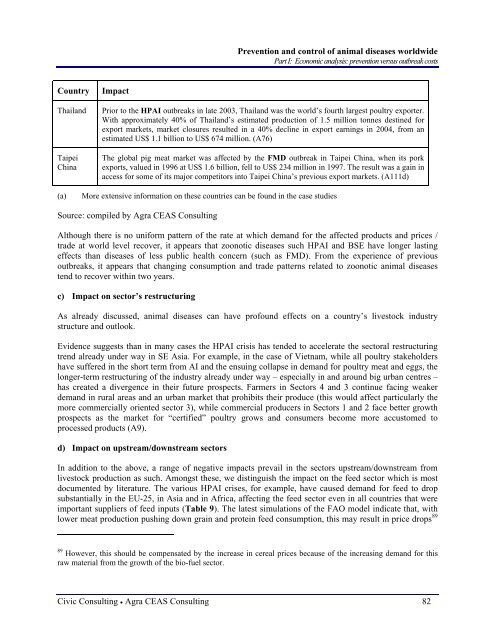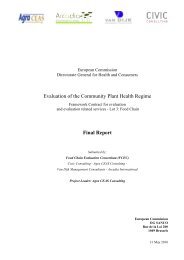2294 part 1 final report.pdf - Agra CEAS Consulting
2294 part 1 final report.pdf - Agra CEAS Consulting
2294 part 1 final report.pdf - Agra CEAS Consulting
You also want an ePaper? Increase the reach of your titles
YUMPU automatically turns print PDFs into web optimized ePapers that Google loves.
Prevention and control of animal diseases worldwide<br />
Part I: Economic analysis: prevention versus outbreak costs<br />
Country<br />
Thailand<br />
Taipei<br />
China<br />
Impact<br />
Prior to the HPAI outbreaks in late 2003, Thailand was the world’s fourth largest poultry exporter.<br />
With approximately 40% of Thailand’s estimated production of 1.5 million tonnes destined for<br />
export markets, market closures resulted in a 40% decline in export earnings in 2004, from an<br />
estimated US$ 1.1 billion to US$ 674 million. (A76)<br />
The global pig meat market was affected by the FMD outbreak in Taipei China, when its pork<br />
exports, valued in 1996 at US$ 1.6 billion, fell to US$ 234 million in 1997. The result was a gain in<br />
access for some of its major competitors into Taipei China’s previous export markets. (A111d)<br />
(a)<br />
More extensive information on these countries can be found in the case studies<br />
Source: compiled by <strong>Agra</strong> <strong>CEAS</strong> <strong>Consulting</strong><br />
Although there is no uniform pattern of the rate at which demand for the affected products and prices /<br />
trade at world level recover, it appears that zoonotic diseases such HPAI and BSE have longer lasting<br />
effects than diseases of less public health concern (such as FMD). From the experience of previous<br />
outbreaks, it appears that changing consumption and trade patterns related to zoonotic animal diseases<br />
tend to recover within two years.<br />
c) Impact on sector’s restructuring<br />
As already discussed, animal diseases can have profound effects on a country’s livestock industry<br />
structure and outlook.<br />
Evidence suggests than in many cases the HPAI crisis has tended to accelerate the sectoral restructuring<br />
trend already under way in SE Asia. For example, in the case of Vietnam, while all poultry stakeholders<br />
have suffered in the short term from AI and the ensuing collapse in demand for poultry meat and eggs, the<br />
longer-term restructuring of the industry already under way – especially in and around big urban centres –<br />
has created a divergence in their future prospects. Farmers in Sectors 4 and 3 continue facing weaker<br />
demand in rural areas and an urban market that prohibits their produce (this would affect <strong>part</strong>icularly the<br />
more commercially oriented sector 3), while commercial producers in Sectors 1 and 2 face better growth<br />
prospects as the market for “certified” poultry grows and consumers become more accustomed to<br />
processed products (A9).<br />
d) Impact on upstream/downstream sectors<br />
In addition to the above, a range of negative impacts prevail in the sectors upstream/downstream from<br />
livestock production as such. Amongst these, we distinguish the impact on the feed sector which is most<br />
documented by literature. The various HPAI crises, for example, have caused demand for feed to drop<br />
substantially in the EU-25, in Asia and in Africa, affecting the feed sector even in all countries that were<br />
important suppliers of feed inputs (Table 9). The latest simulations of the FAO model indicate that, with<br />
lower meat production pushing down grain and protein feed consumption, this may result in price drops 89<br />
89 However, this should be compensated by the increase in cereal prices because of the increasing demand for this<br />
raw material from the growth of the bio-fuel sector.<br />
Civic <strong>Consulting</strong> • <strong>Agra</strong> <strong>CEAS</strong> <strong>Consulting</strong> 82













